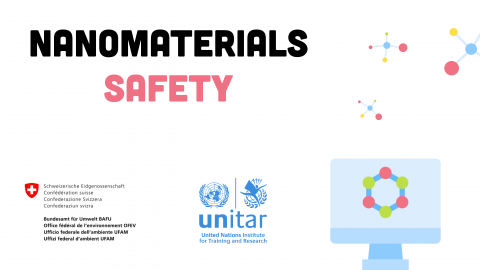
UNITAR Online Catalogue
Nanomaterials Safety Course

Planet
FOEN
Background
The e-Learning course “Nanomaterials Safety” provides interested stakeholders an introduction to the sound management of manufactured nanomaterials. Nanomaterials have a range of novel properties enabling many new, useful applications in areas such as medicine, environment, energy production and material technology.
However, the special properties of nanomaterials can also be a challenge, as these materials may have different implications for human health or the environment compared to traditional chemicals.
The course has been developed by UNITAR, based on work under the Strategic Approach to International Chemicals Management (SAICM) and by other international organizations, such as the Organisation for Economic Cooperation and Development (OECD).
Learning Objectives
Participants will learn about global, national and sector-specific issues, and begin to develop skills for recognising safety concerns and learning about risk management.
After completing the course, participants will be able to:
- Discuss properties, uses, and safety issues of nano-containing products ;
- Classify hazard, exposure and risk assessments, and options;
- Identify opportunities and challenges to regulate nanomaterials;
- Discuss international and national regulatory approaches;
- Differentiate applications and uses of nanomaterials to improve environmental, health, and safety issues.
Content and Structure
Module 1 - Introduction to Manufactured Nanomaterials
- Definition, properties of nanomaterials, use and commerce
- Research programs on nanosafety
- Methods for quantification of nanomaterials in food and consumer goods
- OECD test guidelines for manufactured nanomaterials
Module 2 - Hazard assessment, safety and risks of manufactured nanomaterials
- Hazard assessment of manufactured nanomaterials
- Workplace safety: Occupational exposure and risk assessment
- Consumer safety: Risk assessment in consumer goods
- Environmental risk assessment
Module 3 - Risk management of manufactured nanomaterials, including societal dimensions - global approaches
- Nanosafety as an emerging policy issue (EPI) of SAICM and a workstream of the Basel Convention
- WHO guidelines on protecting workers from potential risks of manufactured nanomaterials
- Safety Data Sheet SDS; Applicability of the GHS classification criteria to nanomaterials
- OECD WPMN as a forum for furthering research / Research needs for the future
- Societal dimensions (economic and social impacts, ethical issues, public dialogue, learning, training, capacity building)
Methodology
The course, about 30-40 hours to complete, is self-paced and adapted to the schedule of full-time working professionals, . Participants are provided with the opportunity to learn through various experiences: absorb (read); interact (activity); and reflect (relate to one’s own reality). This includes videos, interactive lessons, reading materials and quizzes.
The 3 modules of the course are self-standing and can be completed in any order. However, it is recommended that learners complete the Introductive module first.
Each module concludes with a quiz which will assess the knowledge learners will acquire. If learners pass the quiz with a minimum mark of 80%, a certificate of completion will be issued to them.
Participants will be requested to provide feedback on the course by filling in a feedback form after completing all the modules, accessible anytime.
Targeted Audience
The e-learning courses is intented for large range of stakeholders:
- civil servants in national ministries;
- provincial departments and local authorities;
- environmental and occupational safety practitioners in private sector and civil society organizations;
- industry workers or representatives involved in production of nanomaterials;
- faculty members, researchers and students;
- interested citizens.
Additional Information
The course can be completed on a computer (Windows and Mac) or a mobile device. Any internet browser is compatible as long as it has been updated to its latest version.